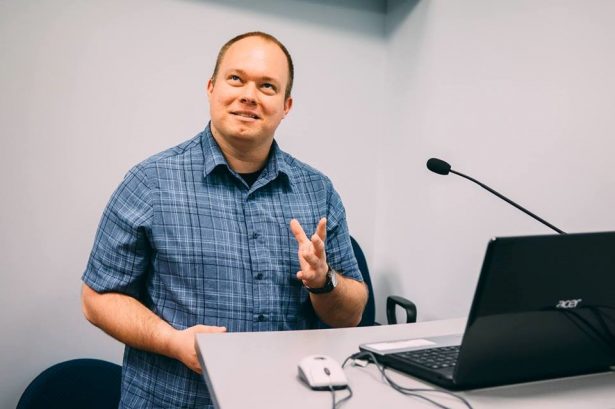As I now prepare for the launch of my debut novel, A Thread of Sky, it’s a bit unnerving to remember that if I hadn’t received a Fulbright grant, my novel might not exist today.
Seven years ago, I was facing my last months as an MFA student and struggling to write a story set in China from my sunlit desk in Iowa. When a friend suggested that I apply for a Fulbright, it seemed a far-fetched notion. As much as I was absorbed in my novel-in-progress, the story of a family of six fiercely independent women who reunite for a tour of mainland China, I knew that I was only beginning to sense its outlines. It was, of necessity, still embryonic, constantly shape-shifting; it did not seem to merit anything so official and distinguished as a Fulbright.
I threw myself into the application process partly out of desperation. I knew of no other opportunity that would enable me to live in China simply to research and write my novel. Also, I was not unmindful of the joke that my MFA diploma might as well be an application for unemployment benefits.
Even after I learned that I had been awarded a grant, and all through my post-MFA summer, which I spent back home in Queens waitressing at a sports bar, the prospect of my Fulbright year still seemed notional. It was only when I landed in Shanghai that September, with nothing to guide me but the study plan I had laid out in my grant proposal, that it all became very real: the story unfolding in my head, the characters that had taken hold over me, the day-to-day discipline of a writing life.
Of course, there were many steps—and seven years—between that study plan and the book that I now hold in my hands: hundreds of pages written and discarded and revised, a grant extension, signing with a literary agent, another arts fellowship, a move back to New York, a variety of jobs, more pages written and discarded and revised, signing with a different agent, submissions to publishers, finding the perfect editors, and more pages written and discarded and revised.
Still, the truth remains that my novel might not exist today not only because I might not have received my Fulbright, but because I might never have applied for it. In light of that, here is some advice for applicants and prospective applicants, particularly my comrades in the arts.
Seize this opportunity.
Funding for the arts is rare enough. An academic year-long grant that not only allows but requires you to do your work while engaging with another culture is unique. Don’t let this one slip past you.
Apply with conviction.
What makes your project vital? Why are you the one to do it? Why do you need to live in your proposed host country to complete it? These questions may be more difficult for applicants in the arts than for those in, say, public health or urban planning, but that’s precisely why you must answer them. This does not necessitate reducing your creative process to a thesis. What are you driven to explore? What moves you? Aim to beguile those reviewing your application the way you would a reader, a viewer, a listener of your art. After all, your application will be reviewed by selection panelists in the arts.
Make a detailed plan.
Make it real to others; make it concrete to yourself. Since the nature of what we do is more nebulous, this is even more crucial for applicants in the arts. Do not allow yourself the possibility of drifting through your Fulbright year.
In my grant proposal, I outlined my intention to make periodic trips to the cities on my characters’ itinerary, viewing the sights through their eyes, experiencing how the mood of each city might correspond or contrast with their conflicts, tackling the problems and possibilities of translation in relation to their linguistic duality, recording the parables and proverbs attached to each tourist attraction—including one that became the title of my book. I also planned to conduct formal research on contemporary Chinese history at Nanjing University and consult with members of the Chinese Writers’ Association.
As it turned out, I never carried out the latter parts of the plan. The first part, along with writing every day, comprised most of my year. I hadn’t anticipated how fully my daily life in China would become my daily inspiration; how even mundane activities such as buying breakfast, doing laundry, riding the bus, might transform themselves into scenes in my novel. Similarly, a casual observation about the strikingly forceful personalities of many Chinese women, in stark contrast to the Western stereotype of docile, dainty objects, led me to research the Chinese feminist movement. This eventually became a major storyline in the novel and brought several characters into focus as never before.
When you’re fully engaged in the creative process, you will diverge from your plan. A Fulbright grant gives you that time and space and freedom to wander. But first, you need a plan, as specific and directed as possible; otherwise, you might find yourself lost.
Brace for feeling alone—better, embrace it.
On top of the outsider status of any American in a foreign country (and, in my case, the double outsider status of being Chinese American in China), I didn’t have a single friend, relative, or co-worker when I arrived in Shanghai. I was affiliated with Fudan University, but I wasn’t taking classes and knew no one there. Among the entrepreneurial types that dominated the expat and local scenes, I was what the Chinese call linglei: a different species. I had met a few other Shanghai-based Fulbrighters at orientation, but we were scattered far apart; besides, their projects seemed utterly pragmatic and clear-cut compared to mine, and I didn’t feel like I had much to contribute to the conversation.
This was the ideal training ground for a novice writer—and, I imagine, for any aspirant in the arts. To be an outsider is to be an observer, to challenge easy assumptions, to take careful note. Perhaps most importantly, a solitary existence allows the creatures of our imaginations to assume central place. While I eventually struck up some close friendships, my only constant companions were my characters. They dictated my schedule, my writing, my research.
Set your sights on Fulbright—and far beyond it.
In my application, I wrote of my intention, upon returning to the U.S., of turning “this personal pursuit into a public work.” At the time, I had no idea whether I would garner any interest from publishers, whether the few chapters I’d written would ever appear in a book. That line was an important signal not only to those reviewing my application, but to myself.
Seize this opportunity to win a Fulbright—and know that whatever happens, it’s not an end. Make this moment the beginning of the rest of your life in the arts.
For more information on Deanna Fei and her debut novel, A Thread of Sky (The Penguin Press, April 2010), please visit http://www.deannafei.com.



4 Comments
Hi Deanna,
I am Yawen Ludden and I have just received a Fulbright Grant to China for research leading towards my dissertation on Beijing opera during the Cultural Revolution. I will spend most of the 2010-11 academic year in Shanghai and Beijing.
I just want to congratulate you on your book publication and let you know that I really enjoyed reading your article, which made me believe that you must be a very good writer and I am going to buy your book!
Also, please contact me if you plan to visit (or not visit 🙂 China this year. I will be happy to meet with you and possibly help you.
Yawen Ludden
Hi Deanna,
Congrats on your debut novel – it sounds like quite a process! What wonderful perspective on Fulbright Arts grants. Thank you for sharing your experience, and the detailed advice and encouragement.
This will be very helpful throughout the Fulbright app. process.
Thank you so much for this blog post. I’m currently in the process of pulling together Fulbright application materials to hopefully go to Romania and write my novel, and I’ve been struggling with how to write a proposal for my project. Your experience has given me a lot of good ideas. Thank you so much.
I am looking forward to reading your book! I have already had my Fulbright in Italy years ago and also lived in Taiwan for three years. So I have been immersed in Chinese culture and am enthusiastic about reading your novel!